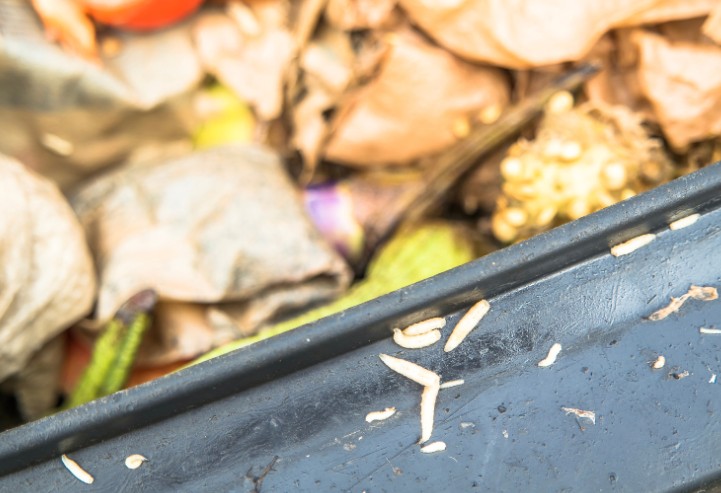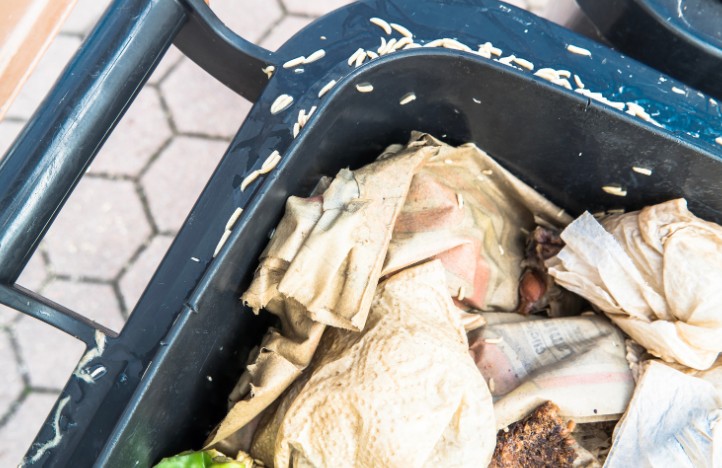- What Are Maggots and Why Do They Appear?
- How Can I Tell If I Have a Maggot Problem?
- What Are 6 Effective Ways On How to Get Rid of Maggots?
- How Do I Prevent Maggots in the Future?
- Comparison Table – Chemical vs Natural Maggot Killers
- Final Thoughts: Don’t Panic – Just Act Fast
- What Are the Frequently Asked Questions On How to Get Rid of Maggots?
What Are Maggots and Why Do They Appear?
Maggots are the larval form of flies, most commonly the housefly. They hatch when flies lay eggs in decomposing organic material like food waste.
I’ve noticed they’re particularly active in the warmer months here in the UK, especially in outdoor bins or food caddies that aren’t emptied or cleaned regularly. Here is how to get rid of maggots.
What exactly are maggots?
Maggots are small, white or cream-coloured larvae that emerge from fly eggs. These eggs can hatch within just 24 hours, which means if food waste is exposed, it doesn’t take long before you’re dealing with a maggot infestation.
Where do maggots come from in the UK?
In the UK, maggots typically show up in kitchen bins, outdoor wheelie bins, or compost heaps—anywhere warm and damp where flies can lay their eggs.
They thrive in conditions where bin hygiene is poor, or where food waste sits exposed for extended periods.
Why do maggots infest bins and homes?
Warm temperatures, food residue, and moist environments create the perfect conditions for flies to breed. Once flies lay eggs on waste, it only takes a day or two before you’ll start seeing maggots wriggling around.
If your bin smells bad or isn’t emptied frequently, it becomes a magnet for fly larvae.
How Can I Tell If I Have a Maggot Problem?
You don’t need to be an expert to spot a maggot issue. If you open your bin and see clusters of tiny white worms, it’s a clear sign.
Signs of a maggot infestation
From my experience, the key indicators include:
- Increased fly activity around the bin area, especially bluebottles and houseflies
- A strong foul odour from decomposing waste
- Visible maggots crawling along the rim or inside the bin
If left unchecked, the infestation can spread quickly, especially during hot spells.

How serious is a maggot problem in your rubbish bin?
While maggots themselves don’t bite or sting, they’re still a health hazard. They can carry bacteria like Salmonella and E. coli, and they attract more flies, making the problem worse. A few maggots can escalate into a full-blown infestation in just a couple of days.
What Are 6 Effective Ways On How to Get Rid of Maggots?
Over the years, I’ve found these six methods to be the most effective when it comes to maggot removal. Each one targets the larvae directly and is suitable depending on how severe the infestation is.
1. Pour Boiling Water Over the Maggots
This is my go-to method because it’s fast, chemical-free, and effective. I boil a kettle and pour the hot water directly onto the maggots in the bin.
The high temperature kills them instantly. Once done, I rinse the bin thoroughly with clean water. This method is ideal for small outbreaks and works best when followed by a good disinfecting rinse.
2. Use White Vinegar or Lemon Juice
If you prefer a natural solution, vinegar or lemon juice is excellent for killing maggots and neutralising odours. I usually mix equal parts of white vinegar and hot water and pour it over the affected area. After letting it sit for about 15 to 20 minutes, I rinse it out.
Not only does it kill the maggots, but it also discourages flies from returning because they hate the acidic scent.
3. Apply Salt Generously to Affected Area
Salt works by dehydrating maggots. When boiling water isn’t an option, I sprinkle table salt over the maggots and leave it for a few hours.
While it’s not as quick as other methods, it does the job effectively overnight. Once the maggots die, I sweep them up and dispose of them in a sealed bag.

4. Try a Household Bleach Solution
For larger infestations, I resort to bleach. I mix one part household bleach with two parts hot water and pour it into the bin. It’s important to do this in a well-ventilated area and wear gloves for safety.
Bleach not only kills maggots on contact but also sanitises the bin and prevents future breeding.
5. Use a Commercial Fly Spray
When I need something strong and fast, I go for a fly spray labeled for use on larvae. I spray it directly on the maggots, close the bin lid, and wait 15 minutes. These products usually contain larvicides that kill the maggots and repel adult flies too.
Always read the label carefully and ensure it’s safe for indoor or outdoor use depending on where you’re treating.
6. Hire a Professional Pest Control Service
If none of the above methods work, or if the maggots keep returning, I call in a professional. Pest control services in the UK have access to industrial-grade treatments that eliminate the larvae and destroy any fly breeding grounds.
This is the best option for severe or recurring infestations, especially in compost bins or commercial premises.
How Do I Prevent Maggots in the Future?
Once you’ve removed the maggots, it’s crucial to prevent them from coming back. Here’s what I do to keep my bins maggot-free year-round.
How to store food waste properly?
I make it a habit to wrap meat and fish scraps in newspaper or compostable bags before tossing them into the bin.
If I know there’s going to be a delay before bin collection day, I sometimes freeze smelly waste to prevent it from decomposing and attracting flies.
What are the Best practices for bin hygiene in UK homes?
Clean bins don’t attract flies. I rinse my kitchen and outdoor bins weekly using either a vinegar solution or a diluted bleach mixture. Keeping the lids shut tight is also essential, as flies only need a tiny gap to enter and lay eggs.
Should I clean my bin weekly?
Absolutely. Regular cleaning removes residue and odours that attract flies. I also sprinkle baking soda at the bottom of the bin occasionally—it helps absorb smells and keeps things dry, making it less appealing for maggots.

Comparison Table – Chemical vs Natural Maggot Killers
| Method | Type | Pros | Cons |
| Boiling Water | Natural | Instant kill, eco-friendly | Needs careful handling |
| Vinegar/Lemon Juice | Natural | Safe, readily available | May not kill all larvae |
| Salt | Natural | Cheap, easy to apply | Slower acting |
| Bleach | Chemical | Highly effective and sanitising | Strong fumes, needs dilution |
| Fly Spray | Chemical | Quick, also kills adult flies | Contains chemicals, indoor caution |
Final Thoughts: Don’t Panic – Just Act Fast
Dealing with maggots is never pleasant, but once you know what to do, the process is straightforward. Personally, I find that boiling water, vinegar, and regular cleaning do the trick most of the time. When that’s not enough, commercial products or pest control services are there to help.
The key takeaway? Act quickly, clean thoroughly, and prevent the conditions that attract flies in the first place. That’s how I stay ahead of the problem—and you can too.
What Are the Frequently Asked Questions On How to Get Rid of Maggots?
1. Can maggots live in sealed bins?
Yes, if flies have already laid eggs before the bin was sealed, maggots can hatch and survive as long as there’s food waste inside. That’s why regular cleaning is essential, even if the lid is kept shut.
2. Is it safe to handle maggots?
It’s safe with gloves, but I avoid touching them with bare hands. Maggots can carry bacteria from decaying waste, which can lead to contamination if you’re not careful.
3. Are maggots harmful to pets or humans?
While they don’t bite, they can transfer bacteria that lead to food poisoning and infections. Pets might try to eat them out of curiosity, so I always keep affected areas clean and covered until the maggots are removed.
4. Why do I keep getting maggots even when the bin is clean?
Sometimes, even clean bins can have tiny food residues that attract flies. It’s also possible that flies are entering during bin usage. I’ve found that using citrus-scented sprays or bin deodorisers helps keep flies away.


0 Comments